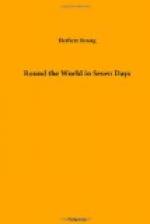“Now I’m not going to make a speech, so I’ll just conclude these few remarks by wishing Mr. Smith a safe journey home, quick promotion, and a seat in the House of Lords. He’s used to going up, and that’s about as far up as he can go.”
When the cheering had ceased, the company crowded about the aeroplane, and gazed at it as if by sheer hard staring they might discover the secret of its speed.
While Rodier explained its working to some of them, Smith sat with the officers, his father and brother, and Sir Matthew, discussing the immediate future.
“You must be very tired,” said his father. “Don’t you think you have better give up the idea of returning at once, and come with us? The Admiralty will stretch a point if we cable an explanation.”
“On no account, father,” replied Smith. “I am going back. I had the good luck to get here in time. That’s all right so far. But after coming through the air I couldn’t stand a slow voyage back; it would be like riding in a growler after a taxi. Besides, I confess I am out to make a record. I can’t make a name in geology, but why shouldn’t I go down to posterity as the first man to fly round the world?”
“In seven days, as Sir Matthew remarked,” added Tom. “It will be rather a feather in your cap, old fellow, if you can do it.”
“Oh, I’ll do it, if only my engine holds out. By the way, Roddy ought to be cleaning up in preparation for starting. I hope he won’t be demoralized by this ovation. Roddy,” he called, “it’s time to clean up.”
“All right, mister,” replied the French man. “I’ll take the shine out of her.”
“Roddy’s English is not perfectly accurate,” said Smith, laughing; “but he’s exactness itself in his work.” He pulled out his watch. “It’s exactly eighty-one hours since I left London; I’ve got eighty-seven to get back in.”
“How will you go?” asked Underhill.
“First to Samoa, then Honolulu, then ’Frisco, and straight across the States.”




